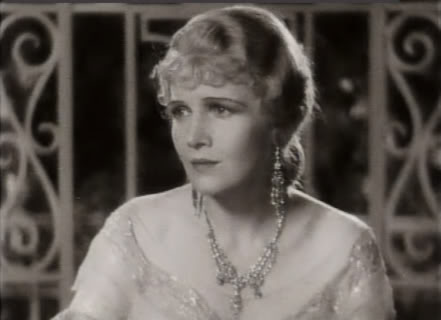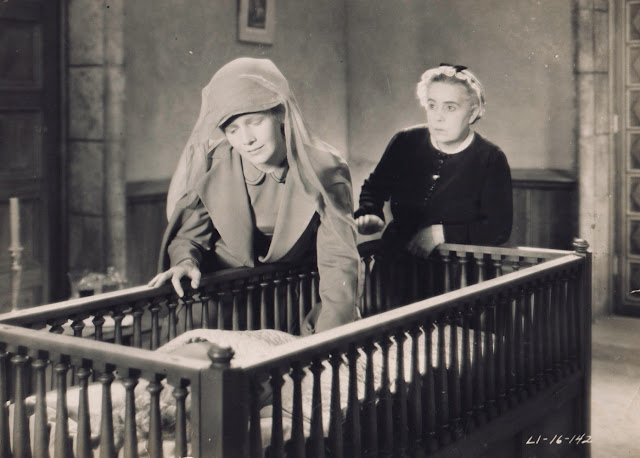East Lynne is one of the many old films that is in desperate need of an official release. A copy exists in the UCLA film archives, missing the final scene, and can be viewed there by appointment for anyone willing to make the trek down to southern California to see it. Fortunately for those of us who live nowhere near UCLA a spliced together nearly complete copy has made it to youtube and can be viewed there with the final reel being filmed bootleg style off of that UCLA print. It’s not perfect but for most of us it is the only feasible way to see this wonderful pre-code film. The last scene is still missing, probably forever, but it amounts to mere seconds and the copy I viewed had a descriptor of what it entailed, allowing me to imagine the final moment since I could not actually see it. Maybe one day the scene will be found and a complete copy will be made available to the public again.
The movie is based on the 1861 novel of the same name by Ellen Wood. That being said, very little of the novel was used for the movie making it nearly unrecognizable as an adaptation. In the novel Isabella actively pursues another man after she has married and it is her own indiscretions that lead to her downfall. The film changes all of this to make it look like she was innocent of what she is accused of, branding her for an impropriety she hadn’t committed. The movie was so different from the novel that the film was adapted into a novelization that followed the plot of the movie, instead. The story was so popular that it was adapted for the screen six different times not including made-for-television adaptations. It also was a hit on the stage where its popularity was so great whenever the theaters needed some guaranteed revenue they would roll it out again. This practice became so common that the catchphrase “Next week, East Lynne!”, became an often used joke in cartoons and comedies, often appearing on signs outside theaters depicted in the films. East Lynnebecame an early example of a pop-culture phenomenon.
The 1931 adaptation of East Lynne tells the story of Lady Isabella (Ann Harding), the “trophy” wife of a man of wealth, Robert Carlyle (Conrad Nagel). She has married him in haste and, upon moving into their home, East Lynne, finds herself the subject of disapproval from his snobbish sister, Cornelia (Cecilia Loftus), who is instantly looking for opportunities to undermine Isabella. Three years pass and Isabella has had a son that she adores. But her penchant for enjoying life to its fullest has lead her to be at odds with her husband who is stodgy and “proper.” The stifling lifestyle he prefers wears on her and Cornelia uses this to her advantage, running to her brother when there is the barest hint of impropriety. Captain William Levison (Clive Brook) visits her in her room during a gathering. He professes his love for her but she turns him away. Cornelia sees him enter the room and tells her brother who in turn kicks Isabella out of the house and refuses her even visitation rights with her son, filing for divorce.
With no options of her own, she leaves with Captain Levison, disgraced and gossiped about everywhere they go. He struggles to keep up with her lavish tastes as they move to Paris and eventually gets in trouble for some poor decisions made to increase their income. He is disgraced and forbidden from returning to England and they end up in Paris just as the French-Prussian War breaks out. As the war rages on she becomes more and more obsessed with reconnecting with her child, even if it is just to see him one last time.
The story of East Lynne is one of complete and utter tragedy. Nearly anyone who has had a child can relate to the sheer torture it would be to be forcibly separated from them. Add to that the injustice of being falsely accused of impropriety and judged legally in a court of law as well as in the court of public opinion and you can see how that would eventually wear down a person’s sanity. Isabella is senselessly torn down by taking away the two things she loves the most, her husband and her son. Even the one thing she could still find joy in, socializing, has been cruelly taken from her as everywhere she goes her reputation follows her.
Her relationship with Robert is thinly defined. We see the two of them kissing passionately in the early scenes but beyond that there is nothing to really show why they love each other beyond the physical. Likewise we get no clear definition as to why Cornelia dislikes her so much. There is a little of Daphne du Maurier’s Rebecca here with the similarities of Mrs. Danvers and Cornelia. Perhaps when du Maurier was writing her novel she had East Lynne in mind. But Mrs. Danvers had a clearly defined motive, her love for her master’s first wife. Cornelia is portrayed as being bitter and spiteful but no real reason is given.
Robert doesn’t fare much better. When his wife is accused of impropriety he instantly turns on her and uses the might of British law to prevent her from ever seeing her son ever again. He never displays a shred of doubt that she may be innocent even when testimony comes out in court denying anything happened. His own servant, Joyce (Beryl Mercer) calls him out in the end for his intense cruelty after Isabella, blinded by an injury sustained trying to escape the war torn Paris to see her son one last time, manages to see him just before losing her eyesight permanently. Only upon hearing this awful fate does Robert feel bad about what he has done to her but by then it is too late to save her.
This is an early talking picture and has many of the trappings that befell those early films. There are plenty of interstitial titles to keep audiences up to speed on the setting and time frame. There are also a lot of static shots inherent with films of this period. But none of this distracts from what is a well crafted film filled with heartache and sadness. The final moment is devastating, especially as Isabella’s son sleeps through the entire time she is last with him. She gets to enjoy, for a short time, seeing him again but he never gets to share in that time. Her final fate is horrific and tragic and Robert will be haunted by what he has wrought for the rest of his life. It is well staged and executed and will stay with you long after the movie ends.
Academy Award Nominations:
Outstanding Production: Winfield Sheehan
____________________________________________________
Release Date: March 31, 1931
Running Time: 102 Minutes
Not Rated
Starring: Ann Harding, Conrad Nagel, Clive Brook and Cecilia Loftus
Directed By: Frank Lloyd









Comments
Post a Comment